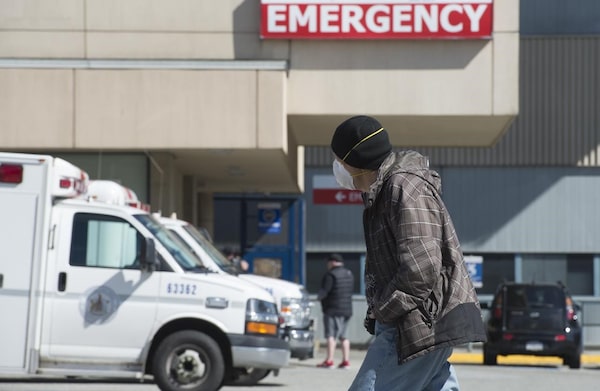
A man wears a protective face mask as he walks past the emergency department of the Royal Columbian Hospital in New Westminster, B.C. Friday, April 3, 2020.The Canadian Press
Métis Nation B.C. is calling on the British Columbia government to set up a toll-free tip line for health care workers in the province to report racist incidents or comments in the workplace, saying immediate action is needed to ensure Métis and other Indigenous people feel safe when seeking medical care.
The call follows the announcement Friday by B.C. Health Minister Adrian Dix that the province would launch an investigation into allegations that health care workers were making a game of guessing the blood alcohol content of Indigenous patients.
Those allegations were part of a statement Friday by the Métis Nation, which said First Nations, Métis and Inuit patients seeking emergency medical care in B.C. are often assumed to be drunk and denied medical assessments. The statement also said a participant in a cultural safety training program described physicians, nurses and other staff trying to guess the blood alcohol concentration of Indigenous patients.
While an investigation into those claims is under way, it’s important health care workers have a way to report troublesome incidents or behaviour without having to worry about losing their jobs or other consequences, said Daniel Fontaine, Métis Nation chief executive officer.
“We’d like to get that established as soon as possible – today – to ensure that any employee, if they see this happening or experiencing this themselves ... that they have a number to call, without fear that they will be punished, fired or reprimanded for raising this as a concern,” Mr. Fontaine said.
Asked if he was concerned that a tip line could result in unfounded allegations, Mr. Fontaine said workers’ ability to disclose was the priority.
“We should be celebrating these people as heroes for exposing this kind of stuff and, over time, it will weed itself out – because it will be seen as not the norm to be doing that,” he added.
Mr. Dix, who learned of the allegations before they were made public, has appointed Mary Ellen Turpel-Lafond, B.C.‘s former children’s advocate, to investigate the allegations.
Mr. Dix said he had online meetings with Indigenous leaders and groups, including the First Nations Health Authority, over the weekend and heard numerous suggestions, including one for a tip line, that would be considered as Ms. Turpel-Lafond investigates.”We not moving to a tip line at this time, but we don’t reject anything out of hand either,” he said.
In a joint statement Friday, the heads of B.C.‘s health authorities said they take such allegations “extremely seriously” and would work with Ms. Turpel-Lafond and the ministry to investigate the issue.
The Métis Nation also posted two reports, both dated March, 2019, related to anti-Indigenous racism in health care.
The reports, based on participant data in the San’yas Indigenous Cultural Safety Training Program, described harms associated with anti-Indigenous racism including medical complications, including a young woman who delayed seeking treatment because of racial slurs she had experienced.
The group says Ontario has made the training program mandatory and would like to see B.C. do the same.
Marilyn Slett, chief councillor with the Heiltsuk Tribal Council, said she was saddened but not surprised by the allegations of a betting game.
In the days since the allegations became public, she’s been fielding calls from Heiltsuk members who told her about negative experiences in hospital emergency rooms and other health care settings.
She hopes Ms. Turpel-Lafond’s investigation will result in more cultural awareness in the health care sector and, if the allegations are confirmed, accountability from the institutions and people involved.
She cited a ceremony this year, where Bank of Montreal managers visited Bella Bella, B.C., to witness a healing ceremony for a 12-year-old Indigenous girl and her grandfather, who were handcuffed outside a Vancouver bank branch after the grandfather tried to open an account for his granddaughter.
“I think the big institutions, like health care and finance, need to face the fact that there is systemic racism,” Ms. Slett said.
Bernie Williams, a long-time community advocate and formerly an outreach worker at the Downtown Eastside Women’s Centre, said she has witnessed racism in health care settings and experienced it herself.
“I would bring clients in and watch how they were received and how they were spoken to,” Ms. Williams said, adding that professionals’ tone and attitude would change on learning a person was homeless or living in a single-room occupancy hotel on the Eastside.
“It just reinforces and reiterates that nothing has changed,” Ms. Williams said.
We have a weekly Western Canada newsletter written by our B.C. and Alberta bureau chiefs, providing a comprehensive package of the news you need to know about the region and its place in the issues facing Canada. Sign up today.